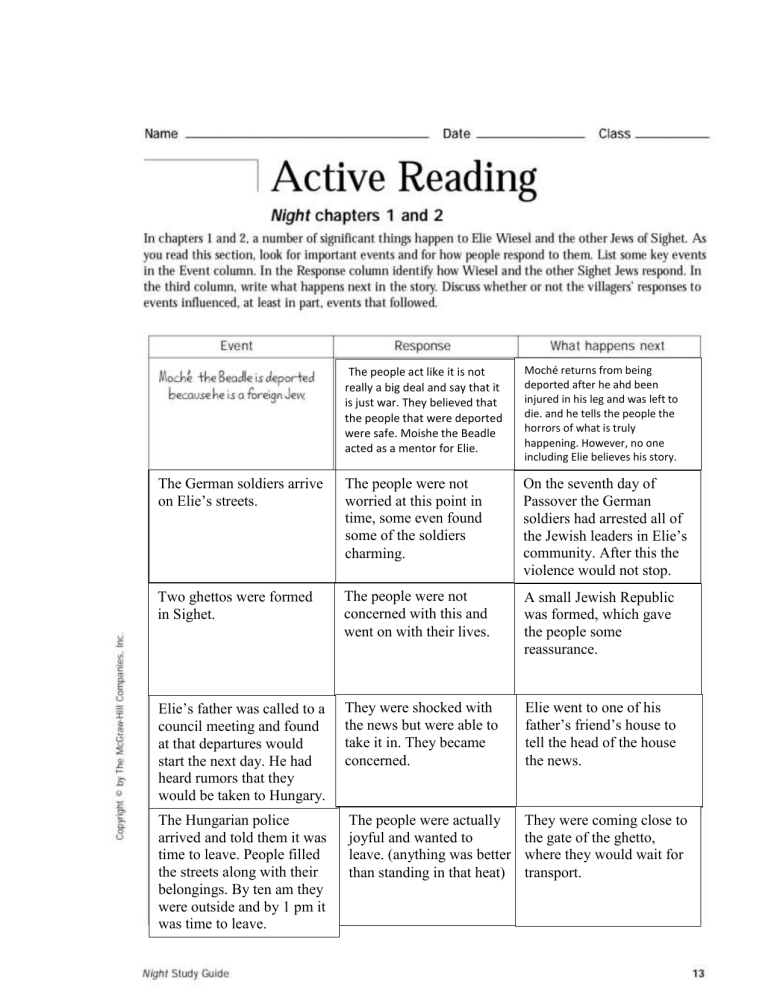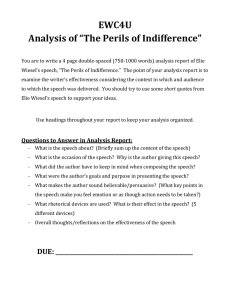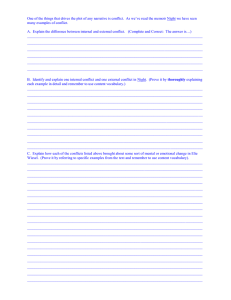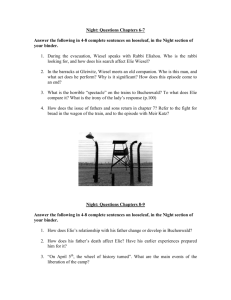
The people act like it is not really a big deal and say that it is just war. They believed that the people that were deported were safe. Moishe the Beadle acted as a mentor for Elie. Moché returns from being deported after he ahd been injured in his leg and was left to die. and he tells the people the horrors of what is truly happening. However, no one including Elie believes his story. The German soldiers arrive on Elie’s streets. The people were not worried at this point in time, some even found some of the soldiers charming. On the seventh day of Passover the German soldiers had arrested all of the Jewish leaders in Elie’s community. After this the violence would not stop. Two ghettos were formed in Sighet. The people were not concerned with this and went on with their lives. A small Jewish Republic was formed, which gave the people some reassurance. Elie’s father was called to a council meeting and found at that departures would start the next day. He had heard rumors that they would be taken to Hungary. They were shocked with the news but were able to take it in. They became concerned. Elie went to one of his father’s friend’s house to tell the head of the house the news. The Hungarian police arrived and told them it was time to leave. People filled the streets along with their belongings. By ten am they were outside and by 1 pm it was time to leave. The people were actually joyful and wanted to leave. (anything was better than standing in that heat) They were coming close to the gate of the ghetto, where they would wait for transport. Night Chapters 1 and 2 Personal Response What is your reaction to the Moché the Beadle? What do you think about his treatment by the villagers after his return from Poland? My reaction to Moché was that he went through so much torment and pain that it broke his spirit. Elie describes how Moché was never the same and how the joy in his eyes were gone in page 7 line 5. I was shocked that none of the villagers, especially the ones he knew, believed him. It is a very extreme thing for a person to make up and all Moché was trying to do was warn his village. 1. Describe Wiesel's community at the beginning of the story. How does young Elie view the world and his place in it? It is evident that Elie’s community is very religious. The community does not necessarily like the needy/poor, but they will help and respect them. Elie views his place in the world was in the house of study. 2.What are some incidents that suggest or foreshadow the coming danger to the Sighet Jews? Why doesn't the community believe it is in danger? Some incidents that suggest upcoming danger are when all foreign Jews were deported, such as Moché the Beadle. However, the Sighet Jews brush these incidents off and continue with their day-to-day life even after Moché tried to warn them about the danger. Another incident would be when Elie’s friends went to the capital for Passover and described the anti-Semitic actions being taken against the Jews of Budapest. 3. What are the conditions on the Jews’ train journey? How do the Jews react to Madam Schäcter’s behavior? What does this reveal about human nature? The conditions on the Jews’ train journey were horrible, the train cars were overcrowded with people. It was so bad that people were not even able to sit to lay down, and there was barely any room to breathe or for air. The Jews react to Madame Schäcter’s behavior by calling her a “mad, poor woman” and trying to calm her down after she saw a fire, that was never actually there. Elie felt pain for her and her sons especially after hearing her sons pleads. The Jews then force her to sit down, then end up bounding and gagging her after they reached their breaking points. This reveals that their human nature at the time was very violent and non-sympathetic. It shows that these people were also broken and had almost no human nature left in them. 4. What connection might there be between Madam Schäcter’s treatment on the train and possible future events in the concentration camp? What are some other ways that Wiesel foreshadows, or hints at, the horrors ahead? The connection between Madam Schäcter’s treatment on the train and possible future events in the concentration camp by foreshadowing the violence that the Jews will inevitably face. Some other ways Wiesel foreshadows the horrors ahead is by telling us Moché story and what he was put through. 5. Even though it was 1944, and Nazi extermination of Jews had begun years earlier, the Sighet Jews had very few facts about it. Do you think it is possible in today's world for a community to know so little, to be so unprepared? Explain. I do not think it is possible in today’s world for a community to know so little and be so unprepared for an event like this. With almost everything being online and on social media I highly doubt that the world would not know, unless a person is isolated or something of that matter. Elie made friends with two brothers, Yossi and Tibi, from Czechoslovakia. A dentist tries to take Elie’s gold crown from his tooth for money. Elie was harshly beaten by a soldier, Idek. Elie was hassled to give up his crown and asked his father for advice. Elie’s father was almost chosen to be killed. Elie lost his faith in God and stopped partaking in religious activities. Night Chapters 3 through 5 Personal Response When he arrives at Auschwitz and then at Buna, Wiesel describes scenes he will never forget. What scenes, ideas, or feelings from the memoir do you find unforgettable? The thing that I find unforgettable is the faces of the children that Wiesel describes. Night page 34, “Never shall I forget the small faces of the children whose bodies I saw transformed into smoke under a silent sky.” The scene that Wiesel describes is so powerful and sad, this quote shows how he is describing the lifeless children in the camp. 1. Describe the conditions first at the Birkenau reception center, the Auschwitz, and later at Buna. How does Wiesel’s relationship with his father change during this time? The conditions at Auschwitz are very horrible, the Jewish people are hardly treated like humans in this camp. They are overcrowded in “bunks” with beds stacked on top of one another. The people in the camps treat Elie and the incoming Jews very brutally and with a lot of hostility. Elie’s relationship with his father changes during this time because he begins to question his faith. However, his farther stays true to their faith and still fully believes in this, this creates a sort of divide between the two. Despite all of this Elie still deeply cares for his father and wants to protect and care for him while they are at the camp. 2.What events lead to the two hangings Wiesel describes? How does Wiesel feel about his evening meal after each hanging? What do his reactions suggested by how he is changing? The events that led to the two hangings was a man who had stolen from the German soldiers, so they sentenced him to be hung. After this hanging Wiesel did not care and went on with his meal and glad, he was not the person who was being hung. The other hangings were two men and a child, this hanging was particularly hard on Wiesel because the child had struggled to die while being hung. It took the child half an hour to die, which would be extremely hard for Wiesel to watch. After this hanging Wiesel had a sickening feeling and had a difficult time dealing with this hanging. His reactions suggest how Wiesel is changing by suggesting that at first he was sort of numb and nonchalant about the whole situation, but after he witnessed a child being hung he realized that the same thing could happen to him. 3. What are some ways that Wiesel and the other Jews at the camps try to observe their religion? How have Wiesel feelings about God changed since his captivity began? The other Jews would pray before they ate, some would gather to pray, and they would pray and sing religious songs before bed. Some of the Jews spoke of God’s word and how redemption would come, but Elie stated that he “ceased to pray”. Wiesel’s feelings about God changed since being in captivity by losing his faith and having a sort of resentment towards God. Before captivity he loved God and to participate in religious activities, but that all changed when he went into captivity. 4. In the camps, Wiesel must struggle to stay alive and to remain human. In your opinion, how well does he succeed with his struggles? Wiesel does not really succeed when trying to remain human, it would be difficult for anyone to do so under the circumstances. You can still tell that he has humanity left in him, but it is buried deep to help cope with the harshness of the camp. 5. There are several discussions about resistance by the prisoners. Why do you think there was no large-scale effort to resist? I believe there was no large-scale effort to resist because the Jews feared the German soldiers, who had intimidating weapons. The Jews spirits had been broken; some had even witnessed other Jews killed by soldiers for just being Jewish, so they did not want to risk it. My stomach is bursting, I can’t go on, groans Elie pushes Zalman to make an effort and at least try to fight for his survival. No desire to get up, wanted to lay in the snow Elie’s father pushes him to get up and go to a shed. His father motivates him to get to the shed. He was cold, he is dead, leave him alone Elie slapped his father for a second time and his father woke up before the gravediggers through him off the train. two hands strangling Elie, could barely call for help, suffocating Elie’s father was too weak to fight off the attacker, so he asked Meir Katz for help, and Elie was freed. End was near, real end, could no longer hold out Someone yelled and told. Everyone to move or they would freeze to death. The passengers listened and worked together in a sense. Chapters 6 through 9 Personal Response What feelings and thoughts went through your mind as you read about Wiesel's final experiences as a German prisoner? What would you say if you could talk to him about this time in his life? What would you want him to explain to you? The feelings and thoughts that went through my mind were that it must have been extremely hard and traumatizing to go through all of this at a fairly young age. I was glad that it was finally ending for him, so he would not be suffering in that horrible place. If I could talk to him about this time in his life, I would not want to trigger him or push him too far, I would just ask how he was able to have the will to persevere through the whole ordeal. I would want him to explain how he felt towards the end of everything. 1.Why do Wiesel and his father leave Buna? How do they respond to the circumstances of the forced march? Wiesel and his father leave Buna because the SS had ordered them to go on a forced march, the two agreed to do so together in the freezing cold snow. They knew they needed to stay alive for each other’s sake, so they pushed through the harsh conditions. They respond to the circumstances of the forced march by adapting to the situation, by trying to not fall asleep in the snow and by Elie trying to teach his dad how to march in place, things like this. 2. What happens between Rabbi Eliahou and his son? What does Wiesel's reaction to this incident reveal about his relationship with God? Rabbi Eliahou’s son had left him when he thought that his father was not strong enough to persevere through the march. Wiesel’s reaction to this incident reveals that he hopes he will not have to face the same issue with his father. This incident reveals that Elie’s relationship with God is broken in a sense, it is apparent that God is not something in his life or something that is valued. 3. How does Wiesel treat his father during the journey to Buchenwald and later during Chlomo’s illness? How does Wiesel’s link to his father affect his will to survive? Wiesel treats his father during the journey to Buchenwald by making sure he was always by his father’s side and constantly tried to motivate his father to stay alive. Elie would encourage his father, for example by telling him “just another moment. Soon, we'll be able to lie down. You'll be able to rest...”. During Chlomo’s illness it is very eye opening to Elie what fate his father may have to eventually face. Wiesel’s link to his father affects his will to survive by believing without his father he would have more strength for himself to survive. 4. Given their life-or-death situation, do you believe Wiesel’s attitude toward his father was understandable? Explain your reactions. I do believe Wiesel’s attitude towards his father was understandable, he had given up, but Wiesel needed him to be alive and have a will to live in order for he, himself, to continue on. They both had been through so much together and had a special type of bound that would be unimaginable to lose after so much pain and suffering. 5. Wiesel Believes that remembering the Holocaust will help to ensure that this type of atrocity does not occur in the future. Do you think learning about historical events can guide people to behave differently? Explain. I do think that learning about historical events can guide people to behave different, by seeing the mistakes made in the past it can show the current generations to not let history repeat itself. By spreading awareness and keeping the victim’s memories alive and shows us the great amounts of pain caused by events from the past. Personal Response Select one portion of the narration in Night and comment on how it “paints a dark and angry picture of human nature.” What circumstances in the memoir allow for this darker side of human nature to emerge? According to Night on page 103, “Suddenly, a cry rose in the wagon, the cry of a wounded animal. Someone had just died. Others, close to death, imitated his cry. And their cries seemed to come from beyond the grave. Soon everybody was crying. Groaning. Moaning. Cries of distress hurled into the wind and the snow.” This portion of night “paints a dark and angry picture of human nature” by showing the pain, fear, and anger everyone felt in the train. After years of torment some of the Jews in the train had changed due to unimaginable amounts of suffering. They were starved, beaten, put in horrid leaving conditions, and went through so much more it is no wonder that some of the people lost their human nature. The Jewish people were NOT treated like humans during this time period, so it is acceptable for some to not have human nature. I chose this portion because it shows how some of the people in the train still had humanity inside of them, they all feared they would die after witnessing yet another Jewish person die in front of them. Page 18 1. How does Wiesel explain the fact that no one in his village believed Moché the Beadle’s warnings? The people think that Moché is crazy and was not being serious about the warnings he was giving. In my opinion I think that the people in his village did not want to believe that something like this could happen to them. 2. At one point during the interview, Wiesel says that one of his first goals was to write for the survivors. Why do you suppose that was an important goal for him? I believe that this is an important goal for Wiesel because his story should be heard, and it gives a voice to the victims of the Holocaust. By writing his book Wiesel may be able to get a form of closure by telling and spreading awareness about his story and the extreme hardships he and other Jewish people faced. 3. Costas asks, “To you, what is happiness?” Analyze Wiesel’s answer. 4. What questions did you have after reading Night? Did Wiesel answer any of these questions in this interview? Some questions I had was how he and his father were able to make it so far, Wiesel did answer this question. It shows that their relationship and love for one another pushed them to continue on and not give up.



